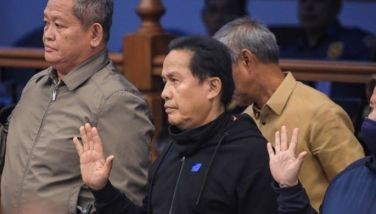French emergency telco group helps link up towns isolated by ‘Pablo’
MANILA, Philippines - In emergency situations, providing reliable telecommunications access to affected communities, as a humanitarian response is as critical as the urgent need for food, water, shelter and medical help.
This was the case for the residents of three coastal towns in Davao Oriental that were displaced by typhoon “Pablo†last December. Most of the structures, including telecommunications infrastructure, in these towns were significantly damaged, if not flattened by strong winds and felled coconut trees.
Télécoms Sans Frontières (TSF), a non-government organization specializing in emergency telecommunications services, has helped save lives by providing valuable communication support to rescue and search teams, aid agencies, and victims in the towns of Cateel, Baganga and Boston for a month in the aftermath of Pablo.
It banked on existing partnerships with Smart Communications Inc. and Vodafone Foundation, the humanitarian arm of one of the largest telcos in the world, to scale up its efforts.
“We are very proud of the joint actions between TSF, Smart and Vodafone in the Philippines. Such cooperation has ensured the success of the emergency response, offering humanitarian workers and affected populations the means to communicate right at the heart of the crisis. We hope to repeat this experience of emergency communications cooperative management,†said TSF president Jean-François Cazenave.
Armed with readily deployable satellite communication equipment, TSF volunteers led by ICT manager Sébastien Latouille went to Davao Oriental, and worked with Smart engineers in setting up satellite voice and Internet facilities in the area. The national and regional offices of the National Telecommunications Commission (NTC) facilitated the deployment of the communication equipment as part of the NTC’s mandate as regulatory body for the telecoms industry.
“Our operation in Davao Oriental was successful. With the help of Smart engineers, we were able to help other organizations save lives and directly support victims’ needs for communications. We are looking forward to future collaborations with Smart on disaster preparedness and response,†said Latouille, who stayed in Davao to oversee operations for nearly a month.
‘Ondoy’ aid
It was not the first deployment of TSF in the Philippines. It also provided voice, data and fax services as well as global positioning system (GPS) devices to the United Nations Disaster Assessment and Coordination teams in 2009 when the country was hit by a string of typhoons, including “Ondoy,†which submerged most parts of Metro Manila and nearby provinces.
Smart’s partnership with TSF, the world’s first humanitarian organization specializing in emergency telecommunications, centered on strengthening the disaster-response skills of its employees as well as members of the National Disaster Risk Reduction and Management Council in times of calamities and emergencies.
TSF trained Smart engineers on the latest satellite communication technologies for use in disaster and emergency situations.
“The three-way partnership of Vodafone, TSF and Smart proved effective as it brought complementary capabilities and skills to a disaster scenario,†said Justin Waller in his report as a disaster response technical consultant for the GSM Association. Waller joined the TSF contingent to Davao Oriental as volunteer.
For TSF and the Vodafone Foundation, the partnership with Smart sped up deployment to the affected areas.
Waller said Smart’s local knowledge and awareness of the situation facilitated effective planning and more efficient use of scarce resources.
For the telco, the partnership made available specialized equipment and services necessary in disaster conditions, complementing its network restoration efforts.
TSF, which is based out of the French city of Pau, was founded to address the critical need for reliable emergency telecommunications services, a result of a simple observation of a handful of volunteers after years of experience with general humanitarian aid in disaster and crisis areas.
TSF missions
During missions responding to the crisis in the Balkans and in Kurdistan during the first Gulf War, TSF’s founders, who were volunteers with SOS Action Humanitaire and Solidarité Pyrénéenne, saw that in addition to medical and food aid, there was a critical need for reliable emergency telecommunications services.
Since conflicts and emergencies often lead to massive civilian displacement and separated families, affected populations are often left with no communication infrastructure in place to find assistance and loved ones.
To address the need for communication services, the founders bought the first satellite phone and TSF was born in July 1998.
Today, TSF plays a key role in strengthening coordination and communication through the rapid deployment of telecommunications services that offer broadband Internet access, voice communications, fax lines and all the IT equipment needed for a field office.
It uses portable and light satellite terminals deployable within minutes with a worldwide coverage. Teams in TSF’s headquarters in France and regional bases in Nicaragua and Thailand are on call 24/7.
In response to the critical need of international response teams that deploy to emergencies for reliable telecommunications services, TSF then expanded its operations, improved its technology, and began establishing rapidly deployable emergency telco services to serve the United Nations, government and NGO humanitarian workers.
Over the years, it has developed a reputation for being among the first to arrive after disasters. In the Philippines, the TSF team was deployed to Davao Oriental, which was isolated due to badly damaged bridges and roads, a few days after Pablo made landfall.
Elsewhere, TSF provided telecommunications support to conflict areas such as Kosovo, Afghanistan and Libya. It also deployed teams to disaster areas such as Nicaragua after it was hit by hurricane “Ida†in 2009; Haiti in the aftermath of the 2010 earthquake; and the Japan during the tsunami and nuclear disaster in 2011.
Since 1998, TSF has intervened in more than 60 countries on five continents, serving hundreds of thousands of victims and more than 700 humanitarian organizations. The average length of a deployment is 47 days, until telecom infrastructure are restored or put in place, until UN agencies and relief organizations set up their own communications, or until the handover to other organization for longer term management.
Its partners include the UN Foundation and European Commission, and the biggest global names in the telecoms and ICT industry, including Vodafone Foundation, Immarsat, Eutelsat, PCCW Global, Astrium, and AT&T.
TSF is one of Smart’s global partners in this field. Smart, through its umbrella CSR program, Kabalikat, has been an active proponent in the industry for emergency preparedness and disaster response since the beginning of the company’s operations.
- Latest





























